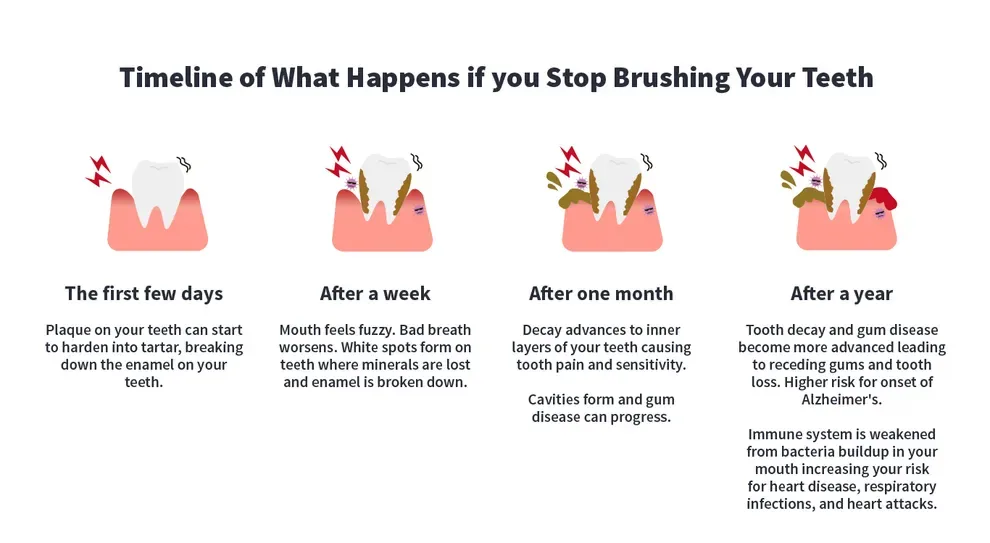What Happens When You Stop Brushing Your Teeth? (Timeline)

Table of Contents
- The First Few Days
- After One Week
- After One Month
- After One Year
- What Happens With No Dental Care?
If you stop brushing your teeth, you run the risk of a multitude of issues, including the following:
Bad breath
Tooth decay
Cavities
Gum disease
Tooth loss
Heart disease and issues
Weakened immune system
Infections
Dementia
The longer you go without brushing your teeth or seeing your dentist, the more problems can crop up and the more significant the complications can get.

The First Few Days Without Brushing
Your mouth is full of bacteria — some good and some bad. Brushing your teeth every day helps to keep this bacterial balance healthy.
When you eat and drink, bacteria mixes with the foods and drinks, causing plaque to form on your teeth. Brushing your teeth helps to remove this plaque and keep it from building up.
Within a few days of not brushing your teeth, the plaque on your teeth can start to harden into tartar. This can start breaking down the enamel of your teeth (the hard outer layer). This is the beginning of tooth decay, which is the destruction of your teeth’s enamel.
What Happens After a Week
Another side effect of not brushing your teeth after even a day is bad breath. Going a week without brushing can make your mouth feel fuzzy and not smell good.
Brushing your teeth with a fluoride toothpaste helps to eliminate bad odors and remove food particles from your teeth, gums, and mouth. Left unchecked, you can develop a bad taste in your mouth and also an unpleasant odor.
The plaque on your teeth will continue to build up without being brushed or flossed off. Then, it will keep breaking down the enamel.
The early stages of tooth decay can set in. At this point, you are likely to notice white spots where minerals are lost and your enamel is broken down.1
One Month Without Brushing Your Teeth
After even longer without brushing or flossing your teeth, tooth decay can advance into the inner layers of your teeth, causing more enamel to be broken down and exposing the soft parts (the dentin). The tooth pulp can also become exposed, which can lead to a higher risk for tooth pain and sensitivity.2
At this point, cavities can form. These are holes in the tooth that require dental treatment and fillings to repair. Lost enamel is not replaceable, and the tooth will need to be filled with a specialized material to fix it.
Gum disease can also become an issue as tartar forms under the gumline and causes an infection in the gum tissue.3 Early gum disease (gingivitis) is treatable with good oral hygiene. However, if you stop brushing your teeth and seeing the dentist, it can advance to periodontal disease.
Good oral hygiene includes brushing your teeth at least two times per day, flossing daily, and visiting the dentist for routine checkups and professional teeth cleanings.
A Year With No Brushing
Prolonged time without brushing your teeth can cause tooth decay and gum disease to become more advanced, which can lead to receding gums and even tooth loss. Additional issues, including a higher risk for the onset of Alzheimer’s disease, can be linked to high levels of unchecked bacteria in the mouth.
An imbalance in oral bacteria is linked to dementia and Alzheimer’s disease, as inflammation in the brain can cause cognitive decline.4 Bacterial buildup in the mouth can also weaken your immune system and leave you more prone to infections and other illnesses. This can also potentially increase your risk for heart disease, respiratory infections, and heart attacks.
What Happens With No Dental Care?
Brushing and flossing your teeth every day is only part of practicing good oral hygiene. The other components of the equation are regular and routine dental checkups and professional teeth cleanings.
If you stop going to the dentist regularly, tartar will build up. This can lead to more significant tooth decay and gum disease. Only a dental professional can remove tartar. Without dental visits, you also run the risk of missing other health issues.
Your dentist is a resource for identifying additional health concerns. A routine dental checkup can often pinpoint underlying medical conditions or concerns that will need to be addressed.
It is important, therefore, to not only brush and floss your teeth every day but also to see your dentist regularly. They may be able to spot any potential issues early, when they can be more easily managed.
